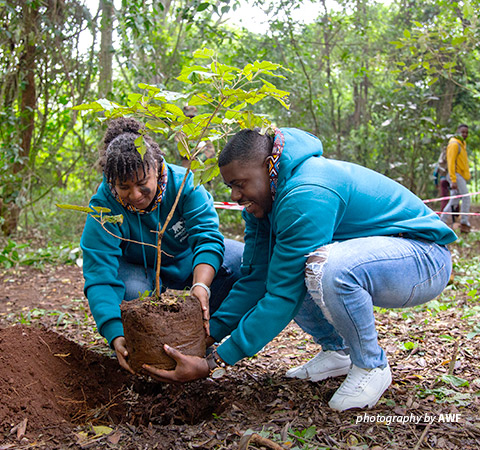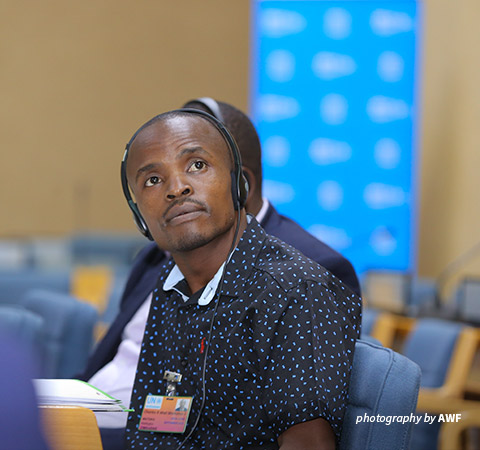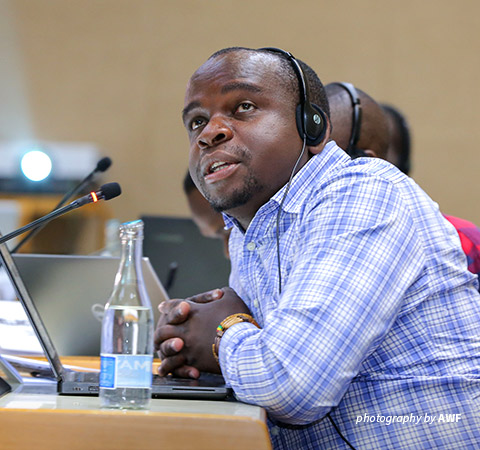Charles R. Wall Leadership Programs’ impact on young Zimbabweans in conservation

Linda Masudze, Graham Ndou, Knowledge Vingi, and Wellington Matsika have benefited from AWF's training in environmental policy, conservation leadership, and management
World Youth Skills Day 2023 is running under the theme ‘Skilling teachers, trainers and youth for a transformative future,’ highlighting the important role that educators play in providing skills for youth to actively engage in their communities and societies.
Declared World Youth Skills Day by the U.N. General Assembly in 2014, July 15 is a day to celebrate the importance of equipping young people with knowledge and expertise for employment, decent work, and entrepreneurship.
In 2022, African Wildlife Foundation (AWF) played its role in imparting skills to young people through the inaugural Charles R. Wall Young African Policy Fellows Program with support from the U.N. Environment Program (UNEP). The annual program equips young professionals with the practical skills, networks, and experience required to become grounded negotiators with a unified voice for African states under the Convention on Biological Diversity (CBD).
In honor of World Youth Skills Day, we interviewed four young people from Zimbabwe who benefited from the 2022 Charles R. Wall Young African Policy Fellows Program and the ongoing 2023 Charles R. Wall Leadership Programs. Knowledge Vingi, Wellington Matsika, Graham Ndou, and Linda Masudze — who work in the conservation field in Zimbabwe — share how the training programs have impacted their professional lives.
“There is not enough support for young people as most of the attention and opportunities are directed to older, more experienced principals,” noted Masudze. However, through the Charles R. Wall Policy Fellows Program, “I have improved on articulating policy issues and also in following up some of the Conference of Parties (CoP) sessions which I had a hard time following through before. I am beginning to understand more about the huge, important role that negotiators play and how I can also use my skills to represent my country better.”
Masudze is currently a 2023 Charles R. Wall Policy Fellow. She works as a Legal Officer at the Environmental Management Agency in Zimbabwe. Since joining the program in March 2023, Masudze says she has learned a lot about environmental governance, CoP meetings, the African Group of Negotiators, and communication skills, among other critical pillars that can be localized in Zimbabwe.
“I am very excited to be a part of the program and find it very informative. I also feel the pressure to disseminate the information we are learning to other young people I work with in the environmental sector, and I have been thinking of ways to do this,” the 27-year-old said. In the next five years, she envisions herself making an impact on biodiversity legal and policy frameworks at local, regional, and international levels.

Graham Kudakwashe Ndou and a Charles R. Wall Leadership Program fellow during a tree-planting activity in Nairobi, Kenya
Twenty-six-year-old Graham Kudakwashe Ndou, in the 2023 Charles R. Wall Conservation Leadership and Management Fellowship (CLMF), concurs with Masudze. “One of the main challenges facing young people has been lack of exposure which ultimately leads to one not having enough experience to make much impact on conservation aspects.”
He feels honored to be part of the CLMF 2023 cohort as a young, ambitious leader passionate about conservation. The fellowship enhances his knowledge and sharpens the soft and hard skills critical for young professionals today.
“I started in April 2023 and, to date, I have learned a lot about leadership, management, and how it plays a critical role in conservation with reference to Africa. I also now have an appreciation of the ‘Theory of Change’ and how it is significant in conservation issues,” Ndou, a Governance Officer at the Zimbabwe Environmental Law Association, reflected.
He is ready to make an impact in conservation circles in Zimbabwe and Africa as a leading conservation professional planning to embark on research and youth trainings in conservation. Added Ndou, “I also see myself becoming a think tank that will aid the public and private sector in terms of conservation.”

Wellington Matsika during negotiation training at the UNEP headquarters in September 2022
Reflecting on the inaugural Charles R. Wall Young African Policy Fellows Program
For Wellington Matsika, the AWF’s Policy and Partnerships Officer based in Harare, being part of the 2022 Charles R. Wall Young African Policy Fellows Program enlightened him on issues critical for Africa to conserve and benefit from biodiversity. Additionally, he learned the importance of information on the genetic and chemical composition of species used in producing chemical resources, the vitality of building alliances, and the need to speak with a unified voice as Africa.
“The program has enhanced my negotiating skills and knowledge about international environmental governance. I can contribute effectively towards policy debates. In the near future, I see myself as an expert in international environmental governance, helping to shape and integrate the African narratives in international agreements,” Matsika highlighted.
The application of the skills he gained is already being witnessed in Zimbabwe as he is one of the young people from the NGO sector invited to review the Draft Agrobiodiversity Policy Framework, the Draft National Financing Strategy for Sustainable Forestry Management, the Draft Animal Genetic Resources for Food and Agriculture National Strategy and Action Plan, as well as the 2023 National Budget.
“It feels surreal to have been part of the program. I was involved in the program through receiving training on negotiating skills and processes followed in negotiating international agreements,” Matsika pondered.
Like Matsika, Knowledge Vingi was a Charles R. Wall Young African Policy Fellow in 2022. The Zimbabwe Youth Biodiversity Network Programs Coordinator reflected on his biggest lesson out of the program: “Africa needs to go to the table with one voice, and to achieve that, we need to understand geopolitical influences and how to overcome them. Only then can we effectively protect its natural resources.”

Knowledge Vingi at a practical negotiation workshop at the UNEP headquarters in Nairobi, Kenya
The 29-year-old believes that more opportunities for learning and practical engagement are key among young people as most conservation students or professionals have never had access to wildlife areas or policymaking platforms. He believes that young people must be involved, capacitated, and given room to show innovations — a long overdue gesture that the Charles R. Wall Leadership Program provided.
“Through the fellowship, I attended AMCEN, the African Ministerial Conference on Environment, in Dakar, Senegal, and learned how regional decisions would come to be [and] feed into the UNCBD process. It was an honor to witness such a process. Before this, I assumed that decisions are made at CoPs, yet most critical positions are arrived at during regional groupings,” Vingi said. “I learned more about the Multilateral Environmental Agreements and how Africa should shape its arguments based on science and research whilst also appealing to the geopolitical front,” he added.
The four also shared their thoughts on expanding young people’s involvement in conservation affairs in Zimbabwe and the African continent. According to Masudze, “More and more young people need to be taught on how to meaningfully engage in a policy formulation process [and] get the attention of the right stakeholders who should be the target of the idea they want to foster.”
Matsika elaborated: “Young people should not be treated as a marginalized group but as a key constituent to collaborate with. Conservation should also respond to the pressing needs of young people — it should improve livelihoods, be more amenable to the use of modern technology, and incorporate fun.”